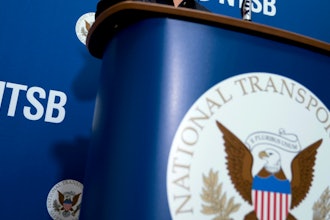WASHINGTON (AP) — The Senate advanced historic immigration legislation across the last procedural test Thursday and prepared to vote later in the day to pass the measure offering the prize of U.S. citizenship to millions.
Next up would be the House, where Speaker John Boehner, R-Ohio, has ruled out taking up the Senate bill and said the Republican-controlled chamber would chart its own version of the legislation with a focus on border security. Many House conservatives oppose the path to citizenship for 11 million people here illegally that's at the heart of the Senate bill.
The 68-32 tally on the final procedural Senate vote was well above the 60 votes required and indicates the bill commands the majority needed to pass the Senate and go to the House. Fourteen Republicans joined 52 Democrats and two independents in voting yes.
The bill is a top priority for President Barack Obama.
As senators cast their votes, several dozen youths wearing turquoise T-shirts emblazoned with the phrase "11 Million Dreams" watched from the spectator gallery. They were from United We Dream, which represents young people brought to the U.S. illegally as children who would get an expedited path to citizenship under the Senate bill, something they've been seeking for years.
"It's landmark legislation that will secure our borders and help 11 million people get right with the law," Senate Majority Leader Harry Reid, D-Nev., said on the Senate floor.
Minority Leader Mitch McConnell, R-Ky., countered that the bill doesn't ensure true border security since people here illegally can obtain a provisional legal status under the legislation before any security goals are accomplished. "This bill may pass the Senate today, but not with my vote. And in its current form, it won't become law," McConnell said.
At its core, the bill includes numerous steps to prevent future illegal immigration, while at the same time it offers a chance at citizenship to the 11 million immigrants now living in the country unlawfully.
It provides for 20,000 new Border Patrol agents, requires the completion of 700 miles of fencing and requires an array of high-tech devices to be deployed to secure the border with Mexico. Those security changes would be accomplished over a decade and would have to be in place before anyone in provisional legal status could obtain a permanent resident green card.
Businesses would be required to check on the legal status of prospective employees. Other provisions would expand the number of visas for highly skilled workers relied upon by the technology industry. A separate program would be established for lower-skilled workers, and farm workers would be admitted under a temporary program.
The basic legislation was drafted by four Democrats and four Republicans who met privately for months to produce a rare bipartisan compromise in a polarized Senate. They fended off unwanted changes in the Senate Judiciary Committee and then were involved in negotiations with Republican Sens. John Hoeven of North Dakota and Bob Corker of Tennessee on a package of tougher border security provisions that swelled support among Republicans.
But it will be difficult for any agreement to be reached between the Senate and the House on the legislation. Further complicating prospects, Boehner made clear Thursday that he did not intend to rely on Democratic votes to pass an immigration bill, a route that many advocates believed offered the best chance of the House producing legislation compatible with the Senate's product.
"The House is not going to take up and vote on whatever the Senate passes. We're going to do our own bill through regular order, and it'll be legislation that reflects the will of our majority and the will of the American people," Boehner told reporters. "And for any legislation, including a conference report, to pass the House, it's going to have to be a bill that has the support of the majority of our members."
In addition to their opposition to citizenship for people here illegally, many in the House prefer a piecemeal approach rather than a sweeping bill like the one the Senate is producing.
The House Judiciary Committee is in the midst of a piece-by-piece effort, turning its attention Thursday to a bill on high-skilled workers.
On Wednesday the committee signed off on legislation establishing a system to require all employers to check their workers' legal status on a faster timeframe than the Senate bill contemplates. And last week it approved two other measures, one establishing a new agricultural guest worker program and a second making illegal presence in the country a federal crime, instead of a civil offense as it is now.
None of the bills weighed by the Judiciary Committee contemplate a path to citizenship or even legalization for the millions already here.






















